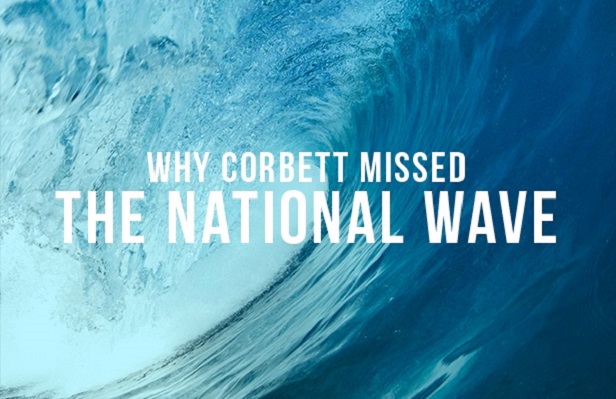Commentary

Why Corbett Missed the National Wave
On November 4th, a national wave swept Republicans to election and re-election in blue states across America. Yet in Pennsylvania, Governor Tom Corbett stood out as an electoral outlier, missing the wave even as the GOP retained 13 of 18 congressional seats, and Republicans grew their majorities in the state Legislature to margins not seen since the 1950s.
Why, then, did those same voters strongly reject Gov. Corbett’s re-election bid by double digit margins in favor of Tom Wolf—a candidate promising higher taxes on the “rich” and more spending on public education? In short, it was Corbett’s public image and a lack of big wins on popular policies. It was not an embrace of bigger and more expensive government.
Poll after poll shows Pennsylvanians want to get the government out of the booze business. They want the option to choose safe and effective schools for their kids. And they understand that property taxes spurred by rising public pension costs are threatening to drive people out of their homes.
These were many of the policy proposals put forth by Gov. Corbett over the last four years. Unfortunately for Pennsylvanians, they never made it to the governor’s desk. In the end, it was Corbett’s inability to achieve major policy reforms coupled with a multi-year, multi-million dollar misinformation campaign led by public-sector union leaders that sank not only his policy agenda but his re-election bid as governor.
Beginning in 2011, public-sector unions successfully promulgated the lie that Corbett cut $1 billion from state education funding. The lie stuck because it was not addressed head on until it was too late and had become a defining narrative in the election.
Government union leaders viewed Corbett’s policy agenda—from liquor privatization to school choice to pension reform—as a declaration of war from day one, and they didn’t let up until his re-election bid had ended.
Indeed, in just the 2013-14 election cycle, government unions donated $7.2 million directly to political candidates—a more than 50 percent increase from the previous election cycle. For comparison, natural gas drillers, often portrayed as major political spenders, donated $8 million to candidates—but that total is from the last eight years combined.
Tom Wolf alone received $2.7 million from eleven different public unions in the gubernatorial campaign.
That’s only direct political action committee contributions—it doesn’t include the lobbying muscle and other political money thrown around by these unions. From 2007 to 2014, government unions spent an astounding $71 million on politics.
This well-funded opposition stymied critical pension reform as well as popular liquor privatization efforts within the past year, either of which would have hugely boosted Corbett’s perception among voters as an effective leader.
Corbett’s counter argument, while more effective in the last few months before the election, ended up being too little and too late. Yet despite his defeat at the polls, voters sustained and expanded Republican control of both the U.S. Congress and the state General Assembly—refuting the argument that voters embraced Tom Wolf’s tax-and-spend campaign rhetoric.
They were more disappointed with Corbett than they were enamored with candidate Wolf.
The re-election of gubernatorial candidates in traditionally blue states is proof that free-market policies can still overcome well-funded opposition and lead to electoral victory.
Voters in Wisconsin and Michigan—swing states like Pennsylvania—supported their incumbent governors’ leadership in taking on and winning transformative reforms. This demonstrates that politicians can champion the interests of taxpayers, workers, and students by taking on Big Labor and win both on policy and at the ballot box.
Good policy—like giving employees freedom of union association in Michigan and ending the taxpayer collection of union political money in Wisconsin—is also good politics. But the lesson of Pennsylvania’s gubernatorial election is that these policies must be communicated to voters convincingly and consistently, while being defended effectively against attacks by those who benefit from the status quo.
# # #
Matthew J. Brouillette is president and CEO of the Commonwealth Foundation (CommonwealthFoundation.org), Pennsylvania’s free market think tank.